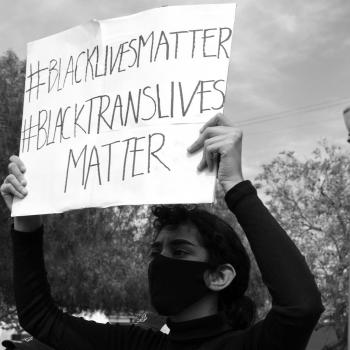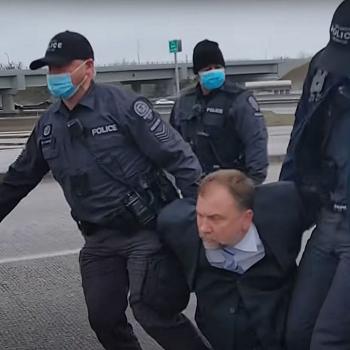At the risk of sounding indifferent, there is some point in the not so distant future when the world has to “return to normal” even though there won’t really be a “normal” to return to. In simplest way to express it, I am saying that people will need to return to work and conduct “life” as we know it. This has become a controversial statement for many reasons, notwithstanding the fact that many people, if not most, believe the best way to move forward in light of COVID-19 is to practice social distancing for as long as possible. Follow this up with proposals for unlimited bailouts from the Federal government, and everything will be just hunky-dory in the weeks, months, and years to come. I’m not an epidemiologist nor the son of an epidemiologist, so I’m not going to get into the specifics of the first argument. For the record, I’ve been in submission to my governing authorities on this one. I’m also not the politician who is in charge of making the unpopular decision on what the best course of action to take is. Last of all, I’m no economist, so my understanding of how the economy will be impacted as a result of the pandemic is also not that of an expert. I’m inclined to believe I am a theologian, though many on Patheos would probably take exception to this also. All of that to say, I recognize when I am out of my depth and will happily concede that I am in the same boat as many, wherein I can only make the best choices with the information available and ultimately live with the results of those in the position to make those decisions.
However, what has become increasingly alarming to me over the past several weeks is that while noble in theory, the practice of social distancing is single-handedly demolishing the economy. Hear me out for a little while; I’m not arguing that money is the end-all-be-all, not in the least bit. I’m not arguing that the state of the economy is more important than people’s lives. That would be utterly worthy of condemnation. I’m also not arguing that I believe the nation itself if necessarily worth preserving over and above people’s lives. I long ago made peace with the notion that the country I live in (as all the countries of the world) will be, as John Piper put it, “…a footnote in history, but the Kingdom of Jesus will never end.” Long after America fades into the annals of history, the church will remain and nothing shall prevail against her. Even in this time where people are unable to meet, the church remains. Until the eschaton, the church will continue in her work which is not hindered by the downturn of the economy, a virus, nor even the gates of Hell.
What I am arguing though is that we cannot pretend as if the state of the economy has no spiritual or physical repercussions upon a nation or a people group within that nation. This is equally true in prosperity as it is in a poor economy, yet the point I am driving towards here is that these things do actually affect people, and therefore, we can’t treat them as non-issues when compared to other issues. We can argue on whether or not one should be affected to the degree that they are, to which I would say that the ultimate outcome in any circumstance ought to mirror Paul’s own in Phil. 4:11-13. Yet to pretend that a poor economy matters very little is to not look with much foresight. I’m not even suggesting that what has been proposed from the top down is wrong, however, I am suggesting that we ought not think these things bear no serious consequences.
As of the end of March, over 10,000,000 Americans filed for unemployment due to the stay at home order. It does us well to remember that the peak of unemployment from the 2007 economic downturn was at 15,352,000 as of Oct. 2009—a figure it took over two years to get to from the initial market plunge. What we are seeing now is simply the beginning of that same trend, as others have pointed out. It is also recognized that there is an inverse relationship between the unemployment rate and the stock market, meaning that as one goes up or down, the other moves in the opposite direction. What we see now in the stock market is also just a foretaste of what is to come. In neither case am I suggesting one ought to downplay how deadly the Coronavirus is. Rather, what I am suggesting is that there are factors which come in to play here that go beyond looking at things in isolation from one another. This pandemic has natural consequences in other spheres of life based on how we choose to respond to it. Those consequences are not necessarily benign.
I also think it is irresponsible, at best, for those who are able to continue in their gainful employment, to look upon people being put out of work with indifference simply because they can collect unemployment. This is, in my opinion, the equivalent of asking, “Am I my brother’s keeper?” For those with good job security, this is essentially an extended, stay-cation that they can put in roughly ¾ of the hours they’d be expected to fulfill at the office. I’m not suggesting you have no opinion to offer on the matter because of this, but simply that perhaps the issue is not as near and dear to your heart as it is for others whose livelihood is being thrown into the blender at the moment.
The natural question also arises for the mass influx at unemployment offices across the nation: how in the world is this helping maintain social distancing? The logical conclusion of this question really moves beyond the immediate repercussions to those of greater importance for those in a stable position: am I willing to help relieve the financial burden of my brothers and sisters within my local church who will be affected by this, or will I do nothing and say to them, “Keep warm and well fed”? While I can easily go further into this argument, or other, related positions which I hold (that it is unbiblical for the government to be the primary custodian of those under duress, especially within the church), what I want to focus on for the remainder of this piece is something entirely different. It has been disturbing to see the accusation that those concerned about an economic downturn or losing our fundamental, constitutional rights, are not concerned about the potential lives lost due to the Coronavirus.
To be sure, there are those who are guilty of this and I don’t seek to defend them in the least bit. There are those more concerned with their pocketbooks than the lives of others, whom they view as expendable, and this ought to be loudly condemned from all sides. I believe there are others though who rightfully see that there is a true ethical dilemma playing out before us. At the heart of each dilemma is the preservation of life. Those who wish for people to shelter in place are doing so for the express purpose of seeking to save lives. Those who wish for people to return to work are also looking to preserve life, as there is a direct correlation to the economy and the suicide rate. People rationalize all sorts of terrible actions during hard times, especially as they have their loved ones in mind, not the least of which figuring in that their lives are often worth more dead than alive. There is also a direct correlation between economic factors and destructive, sinful patterns.
What this ends up creating in the current predicament is an ethical hierarchy, in that one is forced to choose between two unknowns: the potential deaths from economic downturn or the potential deaths from Coronavirus. Both are legitimate threats. One is not able to reduce the other nor dismiss it altogether if we are to be balanced in our thinking, thus, the question becomes one of which we believe will have the greatest impact. Secondly, the question also becomes one in which we must weigh “lesser evils” which fall upon those who will not necessarily die, but whose lives will be forever changed as a result of either course of action. For one such example, take a brief read through this piece that demonstrates how domestic abuse has risen worldwide. I think any sane, humane person would agree that the unforeseen consequence of women and children being battered by their abusers is not an acceptable trade-off. In the rush to implement social distancing though, this was not something factored into the equation, yet it nonetheless presents an ethical dilemma now that cannot be left alone. In other words, the situation is more complex than many are making it out to be, as true ethical dilemmas often are.
What I’m hopeful that people will see in either case is that people are not necessarily moral monsters simply because they favor one over the other at the time being. More information continues to come out at a pace that most simply can’t keep up with, at least at an entirely intelligible level—yet let’s not forget that many of the “experts” in these fields disagree quite sharply as well. Rather than insinuate that the people who disagree on the best course of action are moral monsters, in a manner of speaking, perhaps it is best to slow down and ask if you are rushing to judgment for reasons that may not be entirely driven out of anything but self-preservation. Secondly, as a related point, we ought to be asking some hard questions of ourselves in times such as these. Hardships reveal much about the state of our hearts and what we place our trust in, yet they also tell us a great deal about what we believe in terms of morality. As Dr. Martyn Lloyd-Jones said, “Our behavior in times of need and crisis proclaim what we really are.” Out of these things arises the fundamental issue I believe is much to blame: many people simply aren’t equipped to think through ethical hierarchies or true moral dilemmas, for a myriad of reasons. Some of this is bound up in what type of ethical system one adheres to (or the lack thereof), whether knowingly or not, but by and large much is bound up in a lack of a consistent worldview due to the inability to critically think through all the facets of an issue.
My point in all of this is not to tell you how to think on the matter, nor even what conclusion you ought to reach, but to simply point out what I believe should be obvious: a concern over the state of the economy doesn’t necessarily follow that the individual is not concerned with other factors at play. People can consider both the problem of the pandemic and the solutions proffered to be bad. Even still, they can consider one worse than the other, given the rate at which both the virus and the proposed solutions are wreaking havoc. The issues are real and complex, and deserve more than a dismissive hand waive. The point of contention comes when we recognize that until a viable anti-viral is introduced, there is no real, “permanent” solution to the issues at hand with the current course of action. At some point, life has to go on. Where you draw that line might be different than someone else, but I suspect much of that decision-making process surrounds subjective factors, such as how negatively you are impacted on a professional and economic level, or how greatly you fear death.
What lay behind this statement is the reality that for all of history, life hurdles forward whether or not we are prepared to move on with it. This was the inevitable realization I had to come to when my dad died rather unexpectedly some years back. Life didn’t pause. People around me expressed condolences and continued on with their own doings. My job gave me three days for bereavement leave—a length of time that everyone who has lost someone they loved knows is not nearly long enough. My friends returned to their own lives, in which they no longer thought of my father. My children returned to their light-hearted playing. That didn’t make all of these people out to be cold-hearted monsters who didn’t care about me; it simply reaffirmed the truth that Solomon recognized millennia ago:
For I have taken all this to my heart and explain it that righteous men, wise men, and their deeds are in the hand of God. Man does not know whether it will be love or hatred; anything awaits him.
It is the same for all. There is one fate for the righteous and for the wicked; for the good, for the clean and for the unclean; for the man who offers a sacrifice and for the one who does not sacrifice. As the good man is, so is the sinner; as the swearer is, so is the one who is afraid to swear. This is an evil in all that is done under the sun, that there is one fate for all men. Furthermore, the hearts of the sons of men are full of evil and insanity is in their hearts throughout their lives. Afterwards they go to the dead. For whoever is joined with all the living, there is hope; surely a live dog is better than a dead lion. For the living know they will die; but the dead do not know anything, nor have they any longer a reward, for their memory is forgotten. Indeed their love, their hate and their zeal have already perished, and they will no longer have a share in all that is done under the sun.
Go then, eat your bread in happiness and drink your wine with a cheerful heart; for God has already approved your works. Let your clothes be white all the time, and let not oil be lacking on your head. Enjoy life with the woman whom you love all the days of your fleeting life which He has given to you under the sun; for this is your reward in life and in your toil in which you have labored under the sun (Ecc. 9:1-9, NASB).













